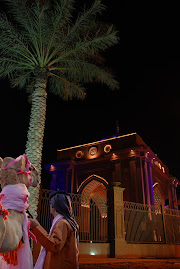Hollywood does not do justice to a Christian Wedding | The National | December 24, 2008
By Tala al Ramahi
The only church weddings I had witnessed were in Hollywood movies. That all changed last week though, when I was actually present in the church, instead of perched in front of my television set watching the ending of yet another romantic comedy.
After living in the UAE for nineteen years of my life, I am still amazed that it took this long for me to visit the church district in the Karama area of the capital.
Saint Andrew’s Church, the Greek Orthodox church in the capital, was a humble structure with an unassuming interior that could probably occupy no more than 200 congregants. St Andrew’s was definitely not as ostentatious as the churches that I had visited during my visits to European cities such as Vienna, Paris and London, but I was nevertheless pleasantly surprised by the various churches that catered to the different Christian denominations present here. There was even an Evangelical church under construction near by.
Unaware of Christian marriage ceremony etiquette, I dressed fairly modestly and arrived 20 minutes earlier than the time it was scheduled to begin.
As soon as the people stood up and turned to face the church door, I understood that it was time for the bride and groom to enter (that I concluded partly from avid movie watching, and partly from common sense). What came next though, was something very familiar, although it completely deviated from the romanticised Hollywood ceremonial norms. And the familiarity actually came from my years of witnessing Muslim marriage ceremonies of friends and family.
The priest commenced the ceremony by reciting some text from the New Testament in Arabic, and then proceeded to say some prayers for the bride and groom, in which we followed each prayer with “ameen”. Right before the ring exchange came the priest’s advice on the duties of the new couple: he first directed the bride to obey her husband because he is the head of the household, before advancing to the groom’s marital duties, which primarily included loving his wife dutifully. Finally came the ring exchange ceremony and the signing of the marriage contract.
Muslim theistic ceremonies do not deviate much from what I witnessed last week at Saint Andrew’s; if you replace the priest with a Muslim sheikh, the church with the wife to be’s home, and the New Testament with the Quran, the rest of the service was all-too-familiar. But it definitely did not resemble Hollywood’s romanticised version of the “I do” ceremony, that is almost always followed by a passionate kiss in front of the altar.
The actual service last week was more conservative, and more akin to what I expected out of a religious service, whether it be Christian, Muslim or otherwise.
What was particularly compelling, however, was how similar the words of advice from the priest were to those given to new Muslim couples. Popular public opinion, at least in non-Arab countries, is dominated by the erroneous assumption that Muslim marriages are plagued with an uneven distribution of power between husband and wife because the Muslim faith provides the husband with such authority. However, listening to the priest’s advice to the new bride, it seems that traditional roles for spouses in the Greek Orthodox faith remain largely unchanged as well, and are actually quite similar to traditional roles expected of Muslim couples.
Of course, the reality of Arab marriages, whether Muslim or Christian, has changed over time, and what is expected from conservative institutions is not always practised by more liberal couples. Furthermore, the changing realities, even the murky economic situation, has modified some century-old expectations. The husband is no longer always the sole breadwinner in the relationship and this role fits better in our globalised world.
In many parts of the world including this one, a single decent job cannot sustain a family anymore and so, the husband’s role as the “head of the household” is more symbolic than anything else. Female emancipation in the region has also sent more women to institutions of higher education and the workplace, allowing them to earn their own living and contribute to the household, which in turn gives them a larger say in household affairs and decision making.
After the ceremony at Saint Andrew’s Church, I left with a clearer sense of the common history and purpose between my Muslim faith and the Christian tradition that had I just witnessed. And as I walked past the Sheikh Mohammed bin Zayed mosque that was adjacent to one of the churches nearby, and heard the Muslim maghrib (sunset) call to prayer, I was overwhelmed by the beauty of the moment. The sun was setting on a day where two lives had just become one at the church, while just next door, Muslims were getting ready to perform their fourth mandated prayer.


No comments:
Post a Comment